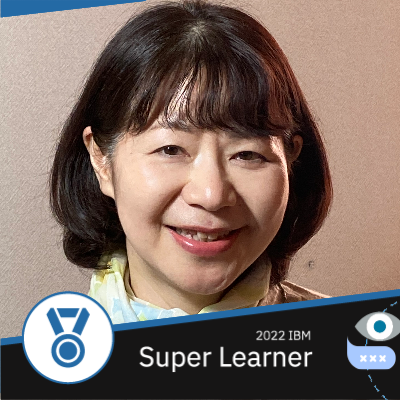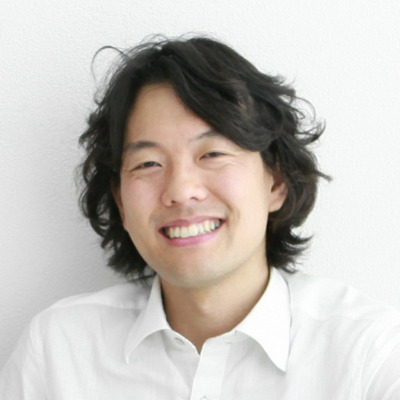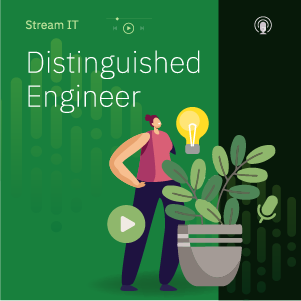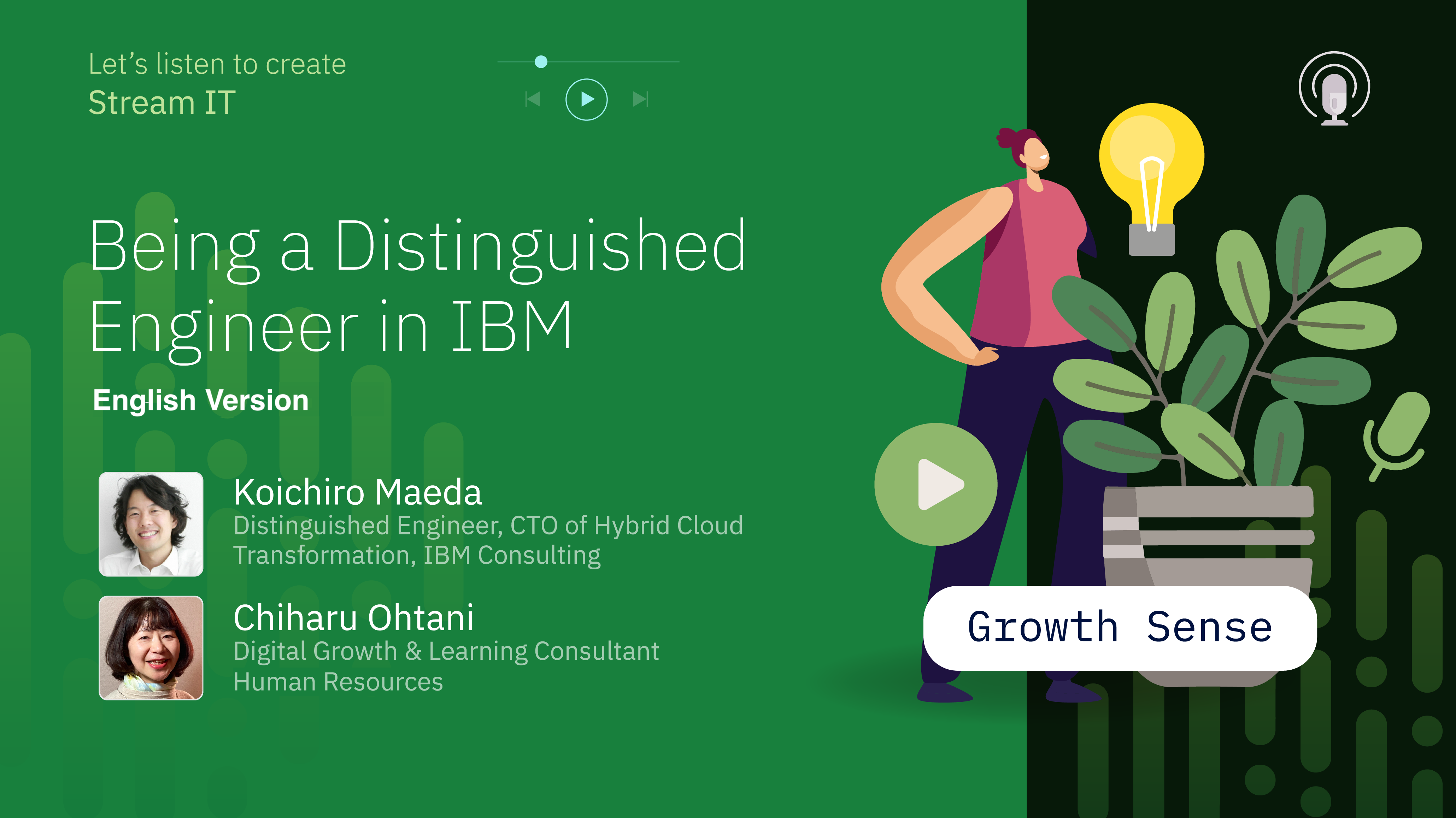Being a Distinguished Engineer in IBM (by Koichiro Meda)
- 0.5
- 1
- 1.25
- 1.5
- 1.75
- 2
Chiharu Ohtani (Host): Hello and welcome to Stream It podcast. Let us take you on a journey with a Distinguished Engineer. Through this podcast, you will meet some of the most brilliant minds from the world of technology, and together with IBM, they are making our world work better. I am Chiharu Ohtani, a passionate experience maker and IBMer and your host for this podcast. Today I have invited Koichiro Maeda, who has been inaugurated at the IBM Distinguished Engineer in 2022. He will provide a lot of fascinating stories including his career. Maeda san, welcome and thank you for joining us today. First, could you introduce yourself?
Koichiro Maeda: Sure. So actually it's very rainy today in Nagoya, but anyway, before moving forward, I thank you, Ohtani san for offering such a great opportunity. It's my great honor to share my thoughts and experiences through Stream It platform. So my name is Koichiro Maeda from Tokyo, Japan. Recently appointed as IBM Distinguished Engineer and the CTO of Hybrid Cloud Transformation, one of the units of IBM Consulting, where we help our clients pursue their hybrid cloud journey. Back in year 2000, I joined IBM Japan as a new graduate and have been with IBM for the past 22 years. I have had many experiences such as overseas assignment and changing job role from specialist to Architect, Architect to business leader, then Distinguished Engineer. Maybe I will talk about it in detail later. If I talk about my family, there are four people in my family, my wife, two lovey daughters who are very keen on Korean pop singers and myself. I am also a runner who loves Marathon. Every year I enroll Mount Fuji Marathon Festival to run around Mount Fuji area with my colleagues. So yes, that's me.
Chiharu Ohtani (Host): Thank you. It's amazing to run a full marathon and I thought it's helpful for your health and a mind refreshing. Now, what is the position of the Distinguished Engineer? Could you give me your feeling of being a DE?
Koichiro Maeda: Okay, sure. As I explained earlier, DE stands for Distinguished Engineer. I originally thought that DE was a unique name and provision that was only understood within IBM, but when I searching the Internet, I found that Sony, Fujitsu or Google, other tech companies also have DE positions. So I was a little bit surprised to learn that other companies also have distinguished engineers, meaning there are actually more DEs in the world than I thought ever. Anyway, DE is a title for the highest class of engineers. IBM expects DE to be (1) a global technical leader in a certain tech domain like AI, Quantum, or cloud. And (2) to lead and advocate for technical and business strategy across IBM business unit. And (3) to perform as a role model for all technical colleagues. Well, how I feel of becoming DE? The first thing I would like to say is the reaction of the people around myself have dramatically changed, especially when I talk to people I met for the first time. The title of DE makes people talk to me in more relaxed manner and they often say things like, oh, speaking of DE, Alex once explained to me about the topic before, or I worked with your DE colleague, Bob, how is he doing? Or something like that. I have a feeling that the images of DE are very concrete among people like on IBM DE must be such person who behaves as such. Maybe this is due to the trust and achievements that all of the senior DEs have built up so far. And I would like to contribute to that heritage, trust and achievements. And how to become a DE? Actually, I'm not allowed to say in details, but in brief there are a couple of criteria that must be met. First, they must have significant achievements and track record that is obvious enough to convince everyone in IBM. The second criterion is personal eminence, in other worlds what you are known for? They need to enhance their own eminence by performing well in each client engagement or publishing books or articles in the academic journals, applying for patents and so on, so far. Then the last criterion is how much other people support them in becoming a DE. In other words, how many letters of recommendations they can gather from wider range of people, tech leaders, business leaders, clients from domestic and from other geographies. So of course it is important to have an excellent level of technical skills, but at the same time I think you found it is equally important to be able to leverage these skills in some business context and let people recognize your skills.
Chiharu Ohtani (Host): Thank you. I understand that the position of the DE is valuable, not only inside IBM, but also people outside IBM. Please tell us your image of IBM DE. Also, what do you think of the senior DE members in IBM?
Koichiro Maeda: Okay, currently there are about 20 DEs in Japan, but when I hear the word DE, it doesn't remind me of something commonized or generalized image of DE, but it reminds me of their individual face or name, because they each is so unique in every aspect. Actually every DE have their own expertise in their own tech domain. At the same time, all of them also have their own concrete point of view beyond their expertise based on the common IBM vision, which is to help a client by leveraging hybrid cloud and AI. They took so passionately to each other to share their own vision and dreams. So I'm aspiring to their super, super greatness. In fact, it is often the case that they speak with clients on behalf of IBM. Sometimes they might be asked to talk about something other than their own tech domain, but they never say, that is not my area of expertise, so I will bring someone. But talk passionately about it with their own point of view. Since I have joined the DE community, I must devote myself to daily activities. So what's not to disappoint our clients and colleagues who have concrete image of what an IBM DE should be or how an IBM DE behave. More specifically, I like to enhance my expertise, look around the world from a broader range of interests and technologies. So I can talk about various things from my own perspective. That I think makes me become a DE with uniqueness and that I think is essential to be successful as a DE.
Chiharu Ohtani (Host): Thank you. Senior DE members have their own aspects and their own knowledge, not only of his specialty, but of the whole technology. These points were very inspiring for us. Okay, let's move on to next. Could you tell us about your career so far?
Koichiro Maeda: Okay, sure. So as I told, I have really been through a lot in 22 years. I could show for half hour or even an hour on this alone, but there have been several turning points in my career, so I would like to focus on those today. So I joined IBM in year 2000 as an engineer specializing in Linux and operating system that is now widely used and also specializing in database like IBM DB2 product. In the meantime, I majored in aeronautics and astronautics in grad school, before joining IBM. And at first I thought that I returned to the grad school to pursue a doctoral degree after spending a couple of years in the business world. The reality is that I didn't go back to the school, but I stayed at IBM, because maybe I found joy in learning something new by collaborating with various kind of people within and outside IBM. If I had been doing less stimulating work in early days at IBM, I might go back to grad school and still be there. So looking back, that was my first turning point. Seven or eight years later, next turning point came. Until then I have been working as a specialist in each tech domain. So I was doing things like database design or implementation or performance tuning, without having much opportunity to understand how the entire system would contribute to the client business. Of course, I felt that I was helping the client engineers, but there was a gap between that and how the database I design was helping the client business. So I wanted to have a feeling that I was contributing to client business or contributing to society. And I wanted to be able to think about the whole picture of the solution to address business problem, business goals or social issues by leveraging and integrating various kinds of technologies. So who was responsible for that? An Architect. So which is why I decided to change my job role to Architect. While being an Architect required me to look over the entire system and a wide range of technical aspects, it also meant that I had to leave the detailed aspect to each specialist. Because I used to be a specialist, I experienced struggle in my mind that I could do that if I wanted to, but I had to leave it to others. It was obvious that it was impossible to handle everything by myself, but it took some time to learn, yes, I can do it, but I dare not do it. So that's how I became an Architect. I really enjoyed being Architect and built my Architect career for the next eight years by designing and implementing conflict architecture, where I leveraged emerging technologies such as cloud computing, mobile, Internet of Things, AI, and so on, so far. So that's my specialty as a DE, actually. The next turning point came in 2015. So 15 years after I joined IBM. I had been an engineer for my entire career, but my manager at the time asked me to become a business manager who thinks of strategies on how to propose and sell IBM's value to clients and to implement such strategies as the IBM business processes. I couldn't have said NO to pursue my tech career rather than considering it as a good opportunity to experience the business. Actually at that point I had been an engineer for 15 years. So I had a general idea of the technical career path I could take if I continued my career as an engineer. Of course, I knew it could lead to the DE position ultimately, but I did not know much about careers on the business track yet, even though I had had many opportunities to work with project managers or consultants who were on business track. So I wondered if I should continue my technical career without experience the business track? After much, much consideration, I decided to jump into the business track and became a business manager. The first six months were tough, because there was a lot to learn, but surprisingly I was able to enjoy and make most of my time as a business manager. So I was beginning to understand the best part of the job and I wanted to see more of the business world. That was when I got an offer to move to Singapore, which was obviously a turning point for me and my family. It was a natural extension of my work career at the time. But in my personal life, it would affect each of my family. So I wonder whether I should decline the offer or move to Singapore alone or move to Singapore with my family. It was essentially different kind of choices than I had faced ever. I have to think about what to do about my wife's job, my daughters' school, and many other things beyond myself. But in the end of the day, I and my family decided to move to Singapore together. So as you all know, Singapore is a multicultural country. Many Chinese, Indians, Malays and expats from Europe and US live in Singapore and it is a melting pot of various ethnic groups and religions. So looking back, I was very lucky that my first overseas assignment was to Singapore, because they were very tolerant of different cultures and when I said Hello, I was welcomed without hesitation. I think I was impressed by the broad minded values and was able to work with them with a fresh mind. Until I moved to Singapore, I had a single stereotypical image of foreign IBM employees such as foreigners are different from Japanese in that they are like this or like that. But when I got to know each one of them in person in Singapore, of course I realized that it was impossible to lump them all together. There were people with various personalities of course. I know this, because I have been there and experienced it, but that was my story of seeing is believing. So I came back to Japan after I spent around two and a half years in Singapore. It has already been four years since I changed my job role from an engineer to a business manager. While catching up in Japan. Another turning point came. If pursuing my career as a business manager, I was supposed to aim for a Partner, which is a common position in consulting firms and if going back to the technical career track, I was supposed to aim for a DE. Of course, I am DE now. So I ended up returning to an engineer. So thinking back over the past four years, I realized that it was surprisingly enjoyable to work in business. To grow a business I had to be creative and make decisions. Of course engineers also have to be creative and make decisions, but business creativity involves making decisions about how to organize the teams to achieve business goals or which to invest with limited money and resources by considering people's motivation, competitors' moves and other factors. While there is no absolute right answer, I found it surprisingly rewarding. At the time I thought I might even consider becoming a Partner. But on the other hand, I had built a career as an engineer over the past 15 years and I felt that it would be a shame to throw that away. When I was torn between Partner and DE, I wondered what senior DEs were doing? After asking around, I couldn't find any examples of Partners with technical leadership roles, but there were a couple of DE's with business leader roles. So if I found both roles exciting, why not aiming for a position where I could do both? That's why I decided to become a DE. Actually, it was a tough transition back to the technical track, because I had friends four years in business track, but somehow I made it. So I have talked about five turning points, the decision of not going back to the grad school, transition from specialist to Architect, transition to business manager and assignment to Singapore. Last one is selecting DE, rather than Partner.
Chiharu Ohtani (Host): Thank you. Now it's very clear that you have always been positive and overcome a lot of things to develop your own career. Now let's move on to the last question. There are many young people in IBM who are aiming for this DE role. Also, I think students and a lot of people outside IBM are the same. Could you give us a message for those people, especially young people?
Sure. So now I'd like to give you three messages. The first thing is how you broaden and deepen your skills. There is a lot of talk about it. I-shaped, T- shaped or H-shaped. There is nothing wrong with having both breadth and depth of skills. However, it is very difficult to pursue both at the same time, because the world is rapidly changing these days. So you may feel you have been left behind when you are concentrating on something deeper and suddenly look around. I think it'll be a good idea if you could take time occasionally to look at the wider range of trends of business and technology and have opportunities to catch up on where your area of expertise stands in those trends or what the future outlook is or what is happening in related areas and so on. The second thing is the relationship between technology and business or between technology and society. I like you all to be aware how you can leverage your skills to achieve business goals and solve social problems. It is certainly important and essential to enhance one zone expertise and it is an important foundation for an engineer. But if just acquiring and utilizing expertise become the objective, it will become unclear what an engineer is for. I would like you to remember that technology is only measures and its purpose is to make your client successful in business or make the world a better place. So I hope that you will pay attention not only to technology trends, but also to social and economic trends or the changes in people's values so that you can start thinking about how to make use of technology and what kind of technology you will learn next. Third and last thing, please keep learning. Some of you might be students and some might be professionals and I'm sure that you are interested in something related to learning. I think that what I learned in my early years at college or in my early days of IBM, has come in handy in many situations. For example, I studied Statistics when I was in college, but at the time I didn't think it would be very useful in the real life. But in fact, system quality and Statistics are closely related. Actually, it has helped me a lot. In linear algebra, which I told I never use in the future, but suddenly came in handy for the first time in a quarter century in order to study Quantum computing. Even American culture course at college also work when working with American colleagues at IBM. Of course there are subject that I have studied, but have not yet had a chance to use, but I believe there will be opportunities here and there to use what I have learned going forward. So I hope that you keep learning with interest and a variety of subjects. There must be a chance to utilize it in future.
Chiharu Ohtani (Host): Thank you. Great. It was an amazing story about connecting the dots. I believe a lot of people are inspired by your career. It sounds brilliant, but there are various worries and deep thoughts behind it. It was a solid story as well. For our listeners, did you enjoy it? We will have more discussion and bring more stories to you in the Stream It podcast. Please look forward to it. Maeda san, thank you for your time today.
Koichiro Maeda: Thank you again Ohtani san for offering such a great opportunity.
Chiharu Ohtani (Host): Thank you. Bye and take care.
DESCRIPTION
In this episode, Koichiro Maeda - IBM Distinguished Engineer and CTO, Hybrid Cloud Transformation, IBM Consulting - talks about his journey to become an IBM Distinguished Enginner (DE) and shares helpful tips on career and how to build your eminence. He lives in Japan.
Today's Host

Chiharu Ohtani
Today's Guests


